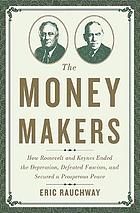
The Money Makers
How Roosevelt and Keynes Ended the Depression, Defeated Fascism, and Secured a Prosperous Peace
کتاب های مرتبط
- اطلاعات
- نقد و بررسی
- دیدگاه کاربران
نقد و بررسی

September 14, 2015
In this informative study, Rauchway (Banana Republican), a historian of the Progressive and New Deal eras, provides a comprehensive account of monetary policies during President Franklin D. Roosevelt’s administration and identifies the influence of British economist John Maynard Keynes, who, due to his prominence and prolific writing, “came to occupy an unusual place” among Roosevelt’s confidants. Faced with historically dire economic conditions and equipped with Keynes’s unconventional yet powerful ideas, Roosevelt essentially ended the gold standard and embarked on an expansionary monetary policy to induce economic recovery, stave off domestic radical and fascist movements, and preserve the capitalist order. Rauchway further argues that Roosevelt “reinvented the United States dollar” to be used as “a tool of economic policy,” forged wartime antifascist alliances, and that Roosevelt created a postwar international system of financial cooperation and stabilization to avoid “the great errors of 1919.” Though the administration continually contended with opposition from conservative financiers, whose frenetic fear of inflation and narrow focus on private profit eclipsed any aspirations for general prosperity, Roosevelt was able to keep bankers at bay. Rauchway’s thoughtful, well-researched narrative history is a valuable contribution to economic history, with ample lessons for the current era. B&w photos.

August 1, 2015
An accessible economic study of Franklin Roosevelt's daringly effective monetary policy in the face of the Depression.The first order of business upon Roosevelt's inauguration in 1933 was to abandon the gold standard, as New Deal historian Rauchway (History/Univ. of California, Davis; The Great Depression and the New Deal: A Very Short Introduction, 2008, etc.) shows in this nicely focused work on the president's gradual adoption of Keynesian policy-without actually calling it that at the time. How did FDR come to understand that the economy needed a policy "guided by the hand of man"? Indeed, Rauchway emphasizes that luck had nothing to do with Roosevelt's policies: he was well-read and well-advised. At the time of economic crisis, bold new ideas had to be embraced, and Cambridge economist John Maynard Keynes was among a group of forward-thinking innovators. Having propounded that the gold standard was unnecessary and irrational in his work on the Indian rupee, he had subsequently set forth a grand scheme to get the post-World War I economy moving normally. However, the plan was rejected by President Woodrow Wilson, prompting the economist to write The Economic Consequences of the Peace (1919), which warned presciently of the cost of excessive reparations on Germany and lack of a stabilizing cooperation among the victors. Rauchway walks readers carefully through these first months and years of FDR's presidency as he moved to raise prices, push through an inflation bill before Congress, and advocate for an internationally managed currency along Keynesian lines. Holdovers from Herbert Hoover's failed policies were nudged out, and the new Keynesian thinkers were in-e.g., Henry Morgenthau Jr., secretary of the treasury, and economics professor Harry Dexter White. Moreover, the new currency program was actively used to thwart fascist extremism abroad. A compelling examination of a still-vilified monetary policy that has continued to show results in spite of conservative criticism.
COPYRIGHT(2015) Kirkus Reviews, ALL RIGHTS RESERVED.

September 15, 2015
Compared to other World War II conferences involving the Allies nations, the Bretton Woods Conference of 1944 has received secondary attention because it involved economists rather than Franklin D. Roosevelt, Winston Churchill, and Joseph Stalin. Yet with the strong support of Roosevelt, the conference led to the creation of the World Bank and the International Monetary Fund. Rauchway (history, Univ. of California, Davis; The Great Depression and the New Deal) succinctly places the conference within its political and economic context, arguing that Roosevelt had the economic smarts and experience from World War I to understand that nations needed to break away from the gold standard to combat the Great Depression and create a postwar economic mechanism to fuel prosperity and peace. This account brings out the personalities of Ambassador Henry Morgenthau and Secretary of State Cordell Hall along with economists John Maynard Keynes and Harry Dexter White. Rauchway finds many consistencies in Roosevelt's economic policies, whereas plenty of historians perceive the New Deal to be a great improvisation rather than a master blueprint. VERDICT A useful, readable companion to Ed Conway's The Summit, which offers a more detailed focus on the conference.--William D. Pederson, Louisiana State Univ., Shreveport
Copyright 2015 Library Journal, LLC Used with permission.

























دیدگاه کاربران